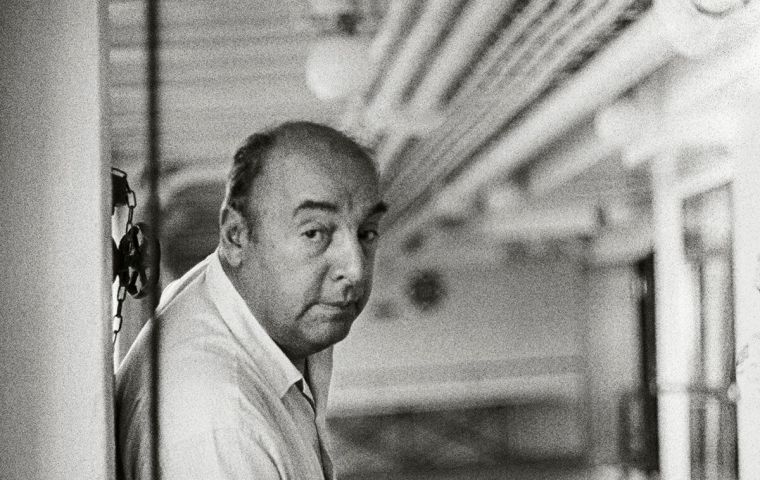MercoPress. South Atlantic News Agency
Chilean authorities reopen probe into Neruda's death
 The poet had prostate cancer but was said not to be terminally ill
The poet had prostate cancer but was said not to be terminally ill Chilean authorities decided this week to launch an investigation into the Sept. 23, 1973, death of Communist poet Pablo Neruda, winner of the 1971 Literature Nobel Prize, who is believed to have been poisoned by the military regime of dictator Augusto Pinochet (1973-1990) less than a fortnight after seizing power in a bloody coup d'état. At that time, Neruda, 69, was said to be suffering from prostate cancer, but it is believed he was not terminally ill by then.
At the request of Neruda's nephews and the Communist Party, a Court of Appeals overruled a decision by Judge Paola Plaza to close the case and began new investigations and forensics in an attempt to unravel the mystery surrounding Neruda's death.
“The investigation was not exhausted, and so the inquiry must be reopened in this process in which Pablo Neruda's death is being investigated,” said Manuel Luna, the Communist Party's lawyer, commenting on the court decision. “We believe there has been great progress, an investigation has been re-established which should lead to precise progress in determining the participation of third parties in Pablo Neruda's death,” he added.
In this regard, the Court has ordered a “meta-examination to review and interpret the results of the investigations carried out by experts from McMaster and Copenhagen Universities”, who analyzed remains extracted from the poet's exhumed body. These investigations have not been able to determine whether or not the “clostridium botulinum” bacteria killed him or whether it was inoculated.
The court ordered the “reopening of the investigation” and the carrying out of the “steps requested by the complainants” that “could contribute to clarifying the facts”, says the decision released by the Judiciary.
The investigation into his death began after his former driver Manuel Araya told reporters in 2011 that the poet may have been poisoned by the Pinochet dictatorship.
Neruda is almost a national hero in Chile, although he has many detractors, not only from groups opposing Communist doctrine. In 2018, a bid to rename Santiago's international airport after him clashed with fierce opposition from radical feminist groups who signaled the poet's moral standards.
The original 2011 proposal argued that “the great Chilean poet is considered among the best and most influential of his century, having been called by the novelist Gabriel García Márquez 'the greatest poet of the twentieth century in any language'.” But feminist organizations argued that at the height of the Me Too movement, it would portray a bad image of the country abroad, based on two dark aspects of Neruda's life: the abandonment of his daughter, Malva Marina, and the rape of a maid in Ceylon (now Sri Lanka), where Neruda was serving as a diplomat in 1929. “His poetry is not enough,” Neruda's detractors insisted, particularly after the story of his daughter became known.
The fictional story “Malva” by Dutch poet Hagan Peeters describes that the girl was born in 1934, with hydrocephalus, and died only eight years later abandoned by her father. When the case was spread in 2016, the Pablo Neruda Foundation, which preserves the author's legacy, issued a note assuring that the separation was by mutual agreement and that “Neruda went to see his daughter the last time he could, in 1939, on the last trip he could make to Europe, and cited poems such as ”Diseases in my house“ to refute the accusation of an abandoning father.
The Spanish Civil War where the Communist Neruda sided with the losing Republicans, the rise of Nazism, and the Second World War made travel to and from Europe difficult.
As for the rape in Sri Lanka, in his memoirs, I confess that I have lived, Neruda, whose real name was Ricardo Eliécer Neftalí Reyes Basoalto, wrote:
”One morning, determined to do everything, I took it tightly from the doll and looked at her face. There was no language I could talk to her about. She let herself be led by me without a smile and soon she was naked on my bed. (...) The encounter was that of a man with a statue. She remained all the time with her eyes open, impassive. She did well to despise me. The experience was not repeated.“




Top Comments
Disclaimer & comment rulesCommenting for this story is now closed.
If you have a Facebook account, become a fan and comment on our Facebook Page!